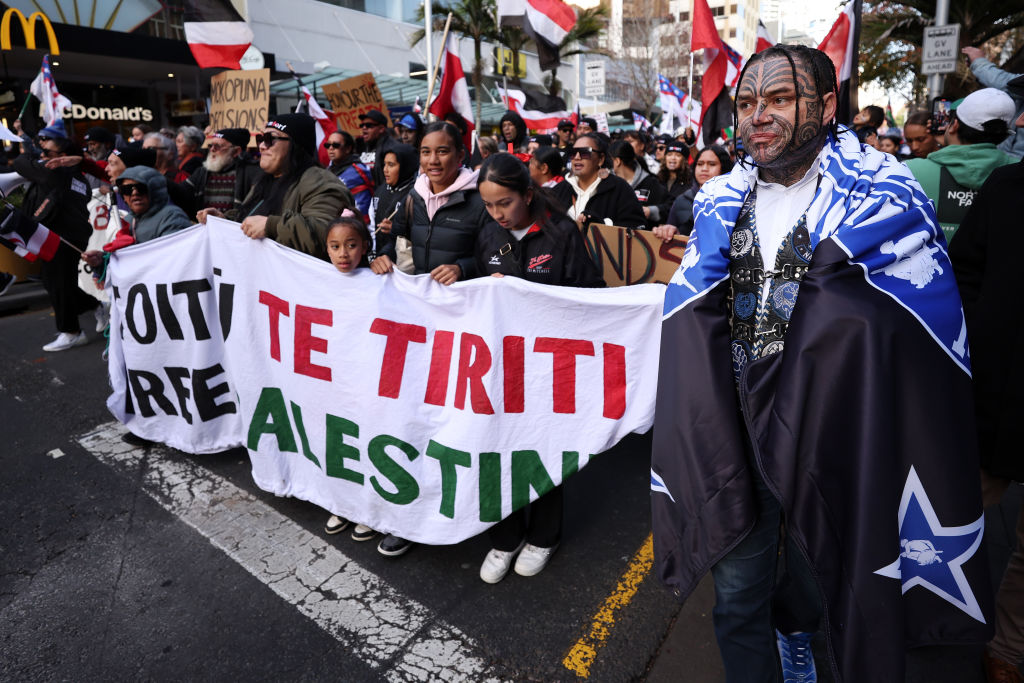The ACT Party’s Treaty Principles Bill—signalled since the coalition was formed—has been introduced to Parliament just as a national protest march sets off.
Junior New Zealand coalition partner, the ACT Party, introduced legislation that could prove to be the most controversial of this government’s term.
The bill is ACT’s attempt to establish, in statute law, what exactly is meant by the three clauses of the Treaty of Waitangi, considered to be the document on which New Zealand was founded.
The Treaty was signed in 1840 and was an agreement between the British Crown and many (but not all) Māori chiefs.
For decades, it played no significant role in lawmaking or the courts, but over recent decades it has come to guide the relationship between the Crown in New Zealand (embodied by the government) and Māori.
In 1975, the Waitangi Tribunal was established to rule on claims by Māori iwi (tribes), and in many cases, has granted them substantial compensation in the form of land and/or money.
The process has always been controversial because the Treaty has two versions: one in English and one in Māori, and they do not say exactly the same thing.
For this reason, the law requires the Tribunal to “decide issues raised by the differences between them.”
It has no power to seize and transfer ownership of any private property, but it can order the Crown to pay compensation where it finds that property was taken in breach of the Treaty.
The final decision on whether to do so, however, rests with the government of the day.

Over time, decisions of the Tribunal and the courts (on appeal) have shaped a large volume of common law around Māori entitlements under the Treaty.
But as tribes began to make claims on something other than their traditional lands—one decision found that Māori had an interest in radio spectrum, even though it was unheard of in 1840—opposition to this approach began to mount among some sections of the population.The Treaty Principles Bill attempts to define the Treaty’s terms in a four-page law and to require that its principles—and not the common law—be used when interpreting legislation.
Opposition to the legislation hinges on the fact that it says “everyone is equal before the law,” which ACT has said means, for instance, that additional funding would not be directed to Māori health or education initiatives despite statistically faring worse than the Pākehā (white) majority.
It commits the Crown to recognising and protecting the rights that tribes had under the Treaty “at the time they signed it.” However, if those rights differ from those of the general population, this commitment applies only if those rights are agreed upon in a historical treaty claim settlement under the Treaty.
ACT’s coalition partners, National and NZ First, have indicated that they will only support its first reading.
That means it will be referred to a Select Committee for public submissions and will return to Parliament for debate but will not pass into law when finally voted upon.
ACT leader David Seymour said it was important the principles of the Treaty be clearly established.
“Either Parliament can define them, or the courts will continue to meddle in this area of critical political and constitutional importance,” he said in a statement.
“The purpose of the Treaty Principles Bill is for Parliament to define the principles of the Treaty, provide certainty and clarity, and promote a national conversation about their place in our constitutional arrangements.”
Later, he told reporters that the Bill “provides an opportunity for New Zealanders—rather than the courts and the Waitangi Tribunal—to have a say on what the Treaty means.
“Did the Treaty give different rights to different groups, or does every citizen have equal rights? I believe all New Zealanders deserve to have a say on that question,” he said.

But it’s that “national conversation” that has opponents undertaking a nationwide protest march from the top of the North Island and bottom of the South, ending up in Wellington.
They claim that—especially with the Bill condemned to fail for lack of support—ACT is pushing ahead with the Select Committee process to provide a platform for anti-Māori sentiment.
The government aggravated tensions by bringing forward the Bill’s introduction from Nov. 18 to Nov. 7, two weeks ahead of the planned arrival of the march and just as Donald Trump’s presidential victory dominated news headlines.
One of the organisers of the march, Eru Kapa-Kingi, said it was occurring in response to several decisions made by the government which amounted to “outright attacks on te iwi Māori.”
“That is what [the Treaty] protects: it protects our right to govern and determine our own lives … so when we say Toitū te Tiriti [honour the Treaty] that is what we are protecting and that is what we are saying is forever.”
Anyone was welcome to join the march, as Māori liberation did not equal Pākehā oppression, Kapa-Kingi added.
It is expected to arrive at Parliament on Nov. 19.

